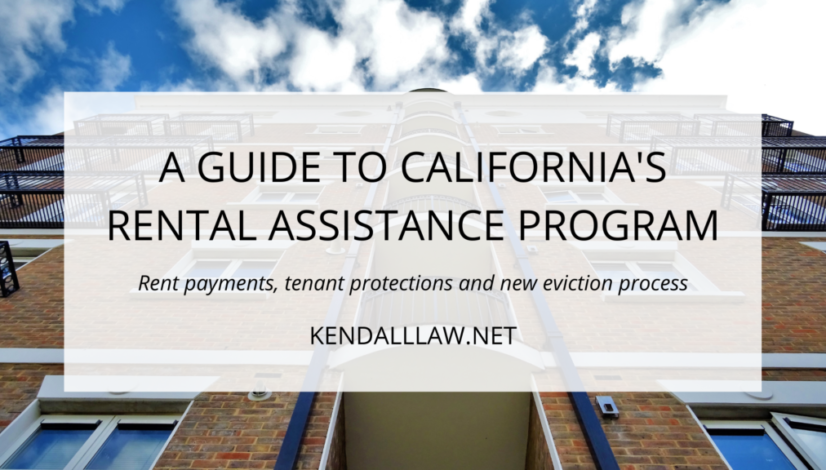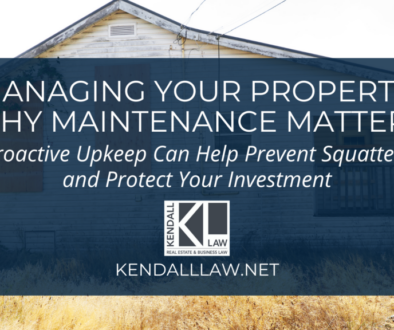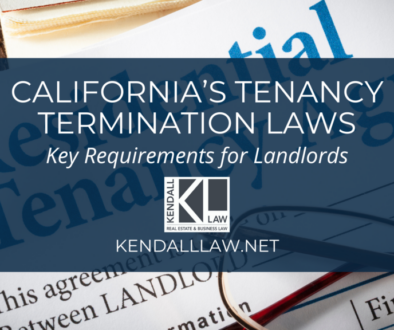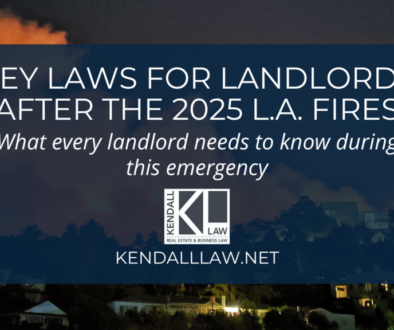A Guide to California’s Rental Assistance Program
On January 29, 2021, With the expiration of AB 3088 just days away, Governor Newsome signed into law SB 91 that extended AB 3088 and set the rules for use of the funds allocated for emergency rental assistance.
Under this new law, Landlords are required to send a notice to residents that have not paid rent no later than February 28, 2021. Failure to do so may affect the ability to evict a resident.
Emergency Rental Assistance
1.4 billion of federal COVID-19 Emergency Rental Assistance Fund will be allocated to the State Rental Assistance Program. Local governments in California have received 1.2 billion in additional funds to administer in their own rental assistance programs.
The funds will be administered by the Department of Housing and Community Development.
The big questions is, who is eligible for rental assistance?
To be eligible to receive rental assistance funds, the household must meet ALL of the following:
- At least 1 person in the household EITHER:
- Qualifies for unemployment benefits, or
- Experienced a reduction in household income, incurred significant costs, or experienced a financial hardship due to COVID-19.
- At lease 1 person in the household can demonstrate a risk of experiencing homelessness or housing instability, which may include any of the following:
- Past due utility or rent notice or eviction notice;
- Unsafe or unhealthy living conditions, or
- Any other evidence of such risk as determined by the Department.
- Household income at or below 80 percent of the area median, as determined by the U.S. Department of Housing and Urban Development.
Just because a household is eligible does not guarantee that the household will be awarded rental assistance. Funds are prioritized first to eligible households with a household income less than 50% of the are median (Los Angeles County the median income is $77,300 and Orange County is $103,000 per the US Department of Housing and Urban Development), then to communities disproportionally impacted by COVID-19 (as determined by the Department), and finally to all other eligible households with a household income less than 80% of the area median income.
A landlord can apply for the rental assistance on behalf of the tenant. The residents will need to cooperate with the landlord.
Eligible households may receive up to 80% of their unpaid rental debt accumulated from April 1, 2020 through March 31, 2021.
By accepting rental assistance, a landlord is required to enter into an agreement with the Department to accept the payment in full of all outstanding rent and release of all claims against the resident for all other outstanding amounts for that debt for that period.
Eviction Protections
SB 91 extends COVID-19 Tenant Relief Act (CTRA) through June 30, 2021.
The tenant’s requirement to pay 25% of the rent due since September 1, 2020, is extended to June 30, 2021. Now, if tenants cannot pay the rent due to COVID 19 Hardship between September 1, 2020 and June 30, 2021 they have to pay 25% of the rent accrued in that time period no later than June 30, 2021.
Landlords must give Informational Notice of COVID-19 Tenant Relief Act Extension and New Rental Assistance Program to anyone tenant that owes rent between March 1, 2020 and February 1, 2021 no later than February 28, 2021.
No New 15 Day notices can be served until the informational notice is sent. If tenants are not paying rent need to serve the 15-Day Notice to Pay or Quit with Hardship Declaration.
If the tenant does not return the Declaration, does not pay the rent or vacate the Landlord can file the unlawful detainer complaint for possession subject to local and federal eviction moratoriums.
If the tenant submits the declaration after the eviction is filed, the tenant has the burden of showing that the failure to return it within the 15 days was a result of mistake, inadvertence, surprise of excusable neglect.
New Requirements for Eviction Process
Before a court can enter judgment the court must verify that:
- The landlord did not receive rental assistance or other financial compensation from any other source corresponding to the amount demanded in the complaint.
- The landlord has not received rental assistance or other financial compensation from any other source for rent accruing after the date of the notice in the complaint.
- The landlord does not have any pending application for rental assistance or other financial compensation from any other source corresponding to the amount demanded in the notice.
- The landlord does not have any pending application for rental assistance or other financial compensation from any other source for rent accruing after the date of the notice.
The amount of attorneys’ fees that can be awarded to a prevailing party in a case based on non-payment of COVID-19 rental debt (rent due between March 2020 and June 2021) may be limited to $500 in uncontested and $1000 in contested cases.
Terminating Tenancy Not Related to Non-Payment of Rent
Evictions are prohibited unless the notice is based on and states one of the just causes specified in AB 1482 (including terminating at expiration of fixed lease term).
- Breach of material lease term
- Maintaining, committing, or permitting the maintenance or commission of nuisance or waste
- Written lease terminated on or after July 1, 2020 and after written request the renter refused to execute a written extension based on similar terms
- Criminal activity
- Assigning or subletting
- Refusing the owner access (Except in LA- See LA Moratorium)
- Using for unlawful purpose
- An employee failed to vacate after termination of employment
- Failure to deliver possession of the unit following written notice to the owner of the renter’s intent to terminate the lease
- Intent by the owner or owner-relative to occupy the unit
- Withdrawal of the rental property from the rental market
- Owner complying with a local ordinance, court order, or other government entity resulting on the need to vacate the property
Other Protections
Cannot charge late fees from a tenant that has submitted a COVID-19 Declaration.
Cannot increase rent or charge new fees for tenants that have submitted a COVID-19 Declaration.
Cannot apply rent payments to any other month than the month it is submitted unless the tenant agrees in writing to have the rent applied to a different month.
Landlords, resident, screening company or other entity is prohibited from using an alleged COVID-19 Rental debt as a negative factor for the purposes of evaluating a prospective housing application or as the basis of refusing to rent to a tenant. This applies EVEN IF NOT due to COVID-19.
COVID-19 Rental debt cannot be sold or assigned.
Cannot apply security deposit to COVID-19 rental debt.
There are a lot of changes regarding rental assistance, handling tenants, evictions and more! Please be sure that you contact a qualified attorney like Kendall Law to help you understand rights, obligations and the law as it applies to your particular situation. Contact us at (310) 619-4941 so we can help you take the right steps and hopefully avoid costly litigation. Kendall Law is here to help.
Author: Eileen Kendall





